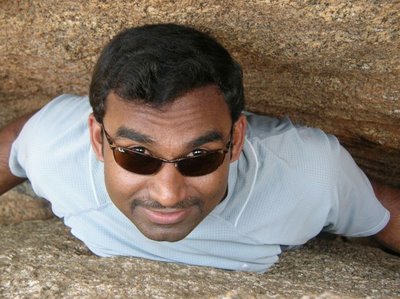One year in South Korea!
안녕하세요.
Time, is what I respect the most, for, we have no control over it. Memories of my first day in Korea are still fresh in my mind. When I landed at the Incheon International Airport, the immigration officials stamped my passport without a single question. After the formalities were completed, the gentleman at the counter just looked at me, smiled, and wished me a nice stay. I said to myself, aren't these Koreans scared of the brown people like the Americans are? As I walked away from the counter, I remembered the times when the authorities at the American airports used to almost strip us nude in the name of security checks.
The people here are friendly, helpful and have special respect for Indians. Indians are known to Koreans as the people with high IQ levels and extra-ordinary abilities in Mathematics. Mahatma Gandhi and Yoga are as famous here as in any other part of the world. Though the language barrier can at times be a bigger problem than you would expect, the helpful nature of the locals makes up for it. Safety is very high, and most cities get awarded for Zero-Crime rate every year.
Its been a mixure of experiences over the last one year. I had interactions with various kinds of people at work and outside work, firsthand experience of what an Asian country with rich cultural history would become when influenced by the western world. I now have good reasons and evidences to picture major Indian cities becoming similar to the cities in Korea.
Personally, it has been a great year. With food, travel and adventure being my passions, I have enjoyed the natural beauty of the Korean terrain, islands and beaches. I have travelled across the length and breadth of the country, tasted various variety of foods, participated in many festivals and local cultural events, indulged in many adventure sports on land, water and air, climbed up the country's tallest peak, and enjoyed the long drives at speeds exceeding 185kmph without getting a speeding ticket. This would probably go down the memory lane as the best year spent on travel and adventure. But ironically, I will also remember this as the year in which I missed my family the most.
Professionally, its been a mixed bag of experiences. Working for the world's leader and largest company in its respective domain has its own pros and cons. For a professional like me who has been molded for years in a western work environment, this has been a good experience and an eye-opener to the ways of the East-Asians. Though English language is not native to India, we all know that the language of the British comes to us more naturally than our own. Therefore, surviving in a non-English speaking country and work environment is a challenge in itself. More so with all the technical material published in the native language, and all forms of communication and meetings happening in the native language.
This came to me as an opportunity in disguise to learn a new language. Korean language has evolved from Mandarin, and a lot of Hanja words are used even today. The script is relatively new, and has undergone many changes in the recent past too. Arguably, this is said to be the most scientifically designed script, with just fourteen consonents and ten vowels. For the modern and technical english words that have no local representaions, they are used as is and spoken with Korean accent. This is called "Konglish", Korean + English, similar to our "Hinglish". I have spent one year learning the local language, and still continue to. In a few weeks, I will complete my intermediate level certification in Korean language. Knowing the local language has proved to be an advantage and beneficial for my travel and interaction with the locals.
I have thouroughly enjoyed all the vivid seasons and the changes in nature in all the seasons. This difference in seasons is what we miss when we live in cities like Bangalore that have moderate climate throughout the year. The place, the people, the culture. These attributes make a country. If asked to choose between the US, Europe and Korea to make a living outside India, Korea would be my first choice, while the US would not even figure in my list. If you happen to be living in the US, don't ever try to dig deep into that country's past and the present. You will begin to hate that country, and also begin to hate yourself for being there.
All said and done, there is no place like home. I may not get rich financially living in India, as I would if I continued to live in such developed countries. But for me, the riches measured in terms of finances are superficial. What matters the most are the riches measured in terms of relationships, friends, our people, and being a part of the change, growth and development that our great nation is undergoing. I have been a part of this growth until last year, and I feel as though I have already missed out on a lot in the last one year. I am eagerly waiting to complete the last few months of my assignment here and head back to our great nation. A nation that the world will once again bow down to, as it was just a few centuries ago.
The countdown has already began...

